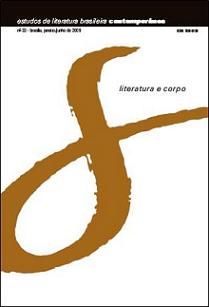Um corpo que oscila:
performance, tradição e contemporaneidade na poética de Ricardo Aleixo
Abstract
O ensaio aborda a performance intitulada o poemanto, de Ricardo Aleixo, na qual o poeta se vale de elementos tradicionais e modernos para produzir um "caos semiótico", onde a poesia funciona como o elemento principal. Os recursos corporais assumem especial destaque na performance, uma vez que o uso da voz e a encenação do corpo, aliados aos poemas lidos e escritos sobre o manto, questionam o lugar do corpo negro na sociedade brasileira contemporânea.
Downloads
References
ALEIXO, Ricardo. Festim. Belo Horizonte: Oriki, 1992.
_______. Máquina Zero. Belo Horizonte: Scriptum, 2003.
_______. “Na encruzilhada, no meio do redemoinho”, em Pedrosa, Celia (org.). Mais poesia hoje. Rio de Janeiro: 7Letras, 2000.
_______. Trívio. Belo Horizonte: Scriptum, 2001.
BASTIDE, Roger. Sociologia. São Paulo: Ática, 1983.
COLOMBRES, Adolfo. “La mediatización de la oralidad”. Revista Casa de las Américas. La Habana: Casa de las Américas, jul.-sept. 1997, nº. 208.
FRASCA, Gabriele. “Dopo la tipografia: la scrittura nell’età multimediale”, em BORSELLINO, Nino e PEDULLÀ, Walter (a cura di). Storia generale della letteratura italiana. XVI: Il novecento sperimentalismo e tradizione del nuovo, seconda parte. Federico Motta Editore, Gruppo Editoriale L’Espresso, 2004.
FREYRE, Gilberto. O escravo nos anúncios de jornais brasileiros do século XIX. São Paulo: Companhia Editora Nacional, 1979.
GIORDANI, Mário Curtis. História da África anterior aos descobrimentos: Idade Moderna 1. Petrópolis: Vozes, 1985.
GLISSANT, Édouard. Le discours antillais. Paris: Seuil, 1981.
GOMES, Núbia Pereira de M. e PEREIRA, Edimilson de A. Ardis da imagem: exclusão étnica e violência nos discursos da cultura brasileira. Belo Horizonte: PUC Minas/ Mazza, 2001.
HARAWAY, Donna. “Manifesto ciborgue: ciência, tecnologia e feminismo-socialista no final do século XX”, em SILVA, Tomaz Tadeu da (org.). Antropologia do ciborque: as vertigens do pós-humano. Belo Horizonte: Autêntica, 2000.
MARTINS, Leda Maria. A cena em sombras. São Paulo: Perspectiva, 1995.
PALMER, Robert. “Griots of West Africa”, em KUNDA, Jali. Griots of West Africa & Beyond. Book and Compact Disc. New York: Ellipsis Arts, 1996.
PEDROSA, Mário. “Arte ambiental, arte pós-moderna, Hélio Oiticica”. Correio da Manhã. Rio de Janeiro, 26/06/1966.
ROJO, António Benítez. La isla que se repite. Barcelona: Casiopea, 1998.
TELES, Gilberto Mendonça. Vanguarda européia e modernismo brasileiro. Petrópolis: Vozes, 1983.
ZUMTHOR, Paul. Introdução à poesia oral. São Paulo: Hucitec, 1997.
RYSEVAS, Tatiana Guerra e ALVARADO, Daisy Peccinini de. “Hélio Oiticica”. Disponível em URL: <http://www.macvirtual.usp.br/mac/templates/projetos/seculoxx/index.html>. Acesso em jan. 2009.
Downloads
Published
How to Cite
Issue
Section
License
Authors who publish in this journal agree to the following terms:
a) The authors maintain the copyright and grant the journal the right of first publication, the work being simultaneously licensed under the Creative Commons Attribution License-Non Commercial 4.0 which allows the sharing of the work with acknowledgment of the authorship of the work and publication this journal.
b) Authors are authorized to enter into additional contracts separately, for non-exclusive distribution of the version of the work published in this journal (eg publish in institutional repository or as a book chapter), with authorship recognition and publication in this journal.
c) Authors are allowed and encouraged to publish and distribute their work online (eg in institutional repositories or on their personal page) after the editorial process, as this can generate productive changes, as well as increase the impact and citation of published work (See The Effect of Free Access).
d) The authors of the approved works authorize the magazine to, after publication, transfer its content for reproduction in content crawlers, virtual libraries and the like.
e) The authors assume that the texts submitted to the publication are of their original creation, being fully responsible for their content in the event of possible opposition by third parties.


